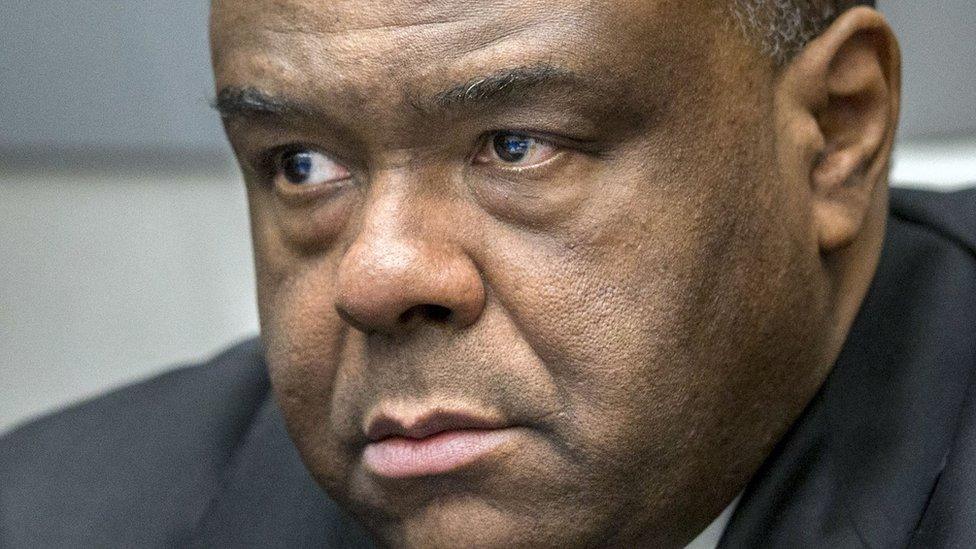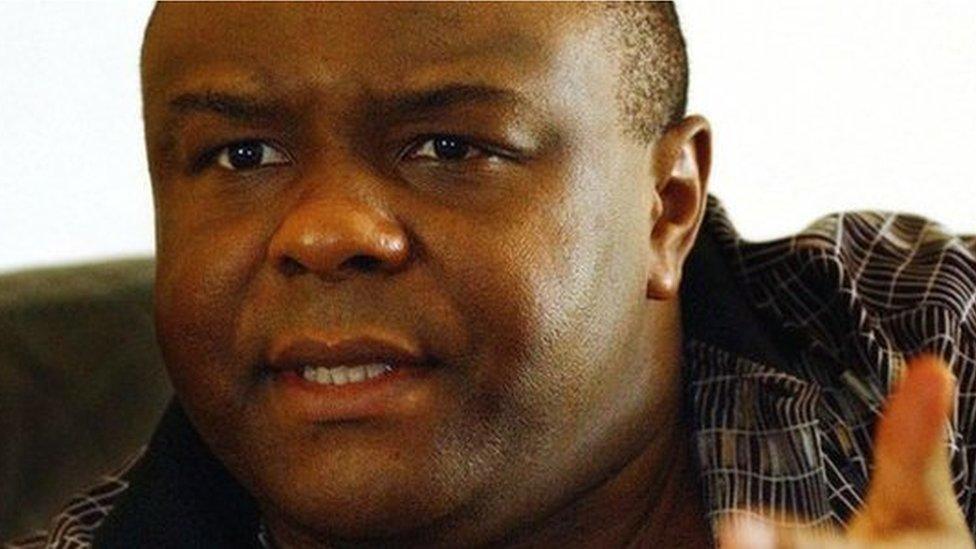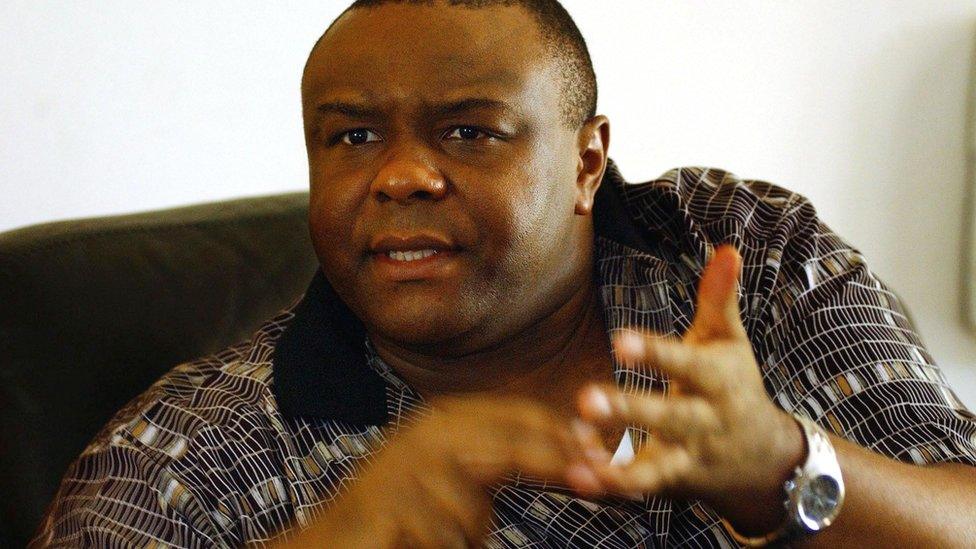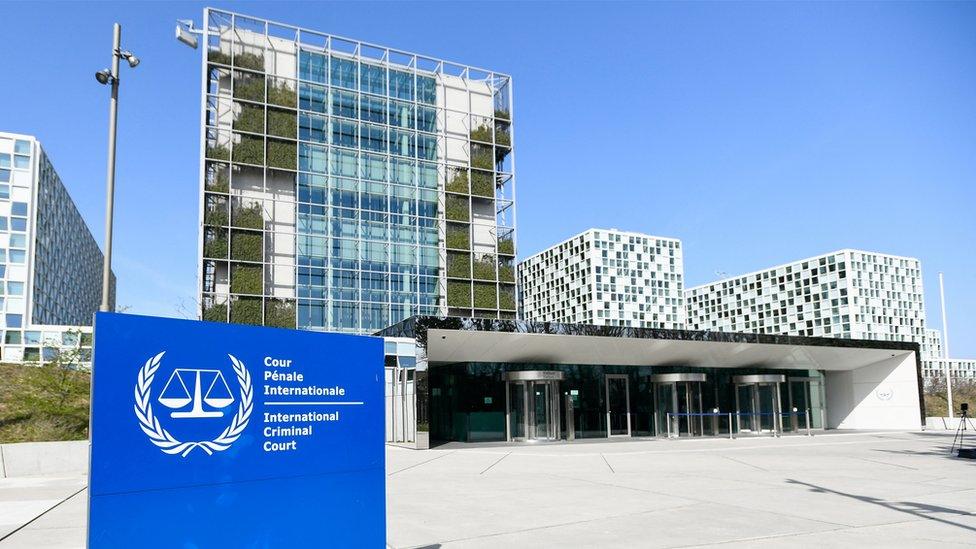Jean-Pierre Bemba: Congo warlord's conviction overturned
- Published

Jean-Pierre Bemba, pictured in 2016, had been sentenced to a total of 18 years in prison
The International Criminal Court (ICC) has overturned the conviction for war crimes and crimes against humanity of former Democratic Republic of Congo Vice-President Jean-Pierre Bemba.
Bemba was found guilty in 2016 of crimes committed in the neighbouring Central African Republic (CAR) from 2002 to 2003.
He was accused of failing to prevent his rebels killing and raping.
But a judge has now said he cannot be held responsible for their actions.
Christine Van den Wijngaert also said the judges in the 2016 case had failed to take into account his attempts to stop the crimes once he was made aware they were taking place.
The decision to overturn the 18-year sentence was greeted with cheers from his supporters in the gallery.
But human rights group Amnesty International said it was a "huge blow" for the victims of a "horrifying campaign of rape and sexual violence", as it called on the authorities to redouble their efforts to prosecute those who had carried it out.
ICC prosecutor Fatou Bensouda described the ruling as "regrettable and troubling".
Before Friday's decision, the ICC had issued verdicts in six cases, with nine people being convicted and one acquitted, external, according to its website.
More than 5,000 survivors took part in the proceedings against Bemba, said Amnesty's head of international justice, Solomon Sacco.
"For these brave individuals, as well as thousands of other victims in CAR, the pursuit of truth, justice and reparations will continue," he added.
Landmark
Bemba's conviction marked several milestones for the ICC. It was the first time the court had focused on rape as a weapon of war, and the first time a suspect had been convicted for crimes committed by others under his command.
The court heard how Bemba sent more than 1,000 fighters to CAR back in 2002 to help then President Ange Felix Patasse put down an attempted coup.
But his forces committed acts of extreme violence against civilians - crimes which the original judges said Bemba was made aware of but did nothing to stop.
However, appeal Judge Van den Wyngaert said the judges in the original case had "ignored significant testimonial evidence that Bemba's ability to investigate and punish crimes in CAR was limited".
Appeal judges also said he had been "erroneously" convicted for specific criminal acts.
Bemba, who has already spent almost a decade in jail, will not be immediately released from detention in The Hague after he lost a separate appeal against a conviction for bribing witnesses.
CAR, meanwhile, has remained in an almost constant state of turmoil. The International Committee of the Red Cross warned in January that half its population was in need of humanitarian aid, while the United Nations has had a peacekeeping force in the country since 2013.
A report by Human Rights Watch in October 2017 said fighters in its most recent conflict, which has been raging for more than five years, continued to use sexual violence to "terrorise women and children".

Elation for some, questions for others
Anna Holligan, BBC News correspondent, The Hague
There were scenes of jubilation never before witnessed inside the International Criminal Court.
Jean-Pierre Bemba's legion of loyal friends and family dressed up for the occasion in vibrant shades of traditional attire.
Their elation was expressed with such vigour the judge called on court staff to restore order.
Some will say the verdict proves this court, often derided as a neo-colonial tool, is driven purely by truth and facts.
But the acquittal is a blow for prosecutors. Jean-Pierre Bemba's conviction was one of their few victories and celebrated at the time as a warning to other leaders that they could be held liable for the actions of troops under their command, even when they're committing atrocities on foreign soil.
Human rights groups are already saying the prosecution must learn from its failures and do more to ensure their evidence can stand up in court.

Who is Jean-Pierre Bemba?

Bemba had good relations with some of Africa's leaders
A well-connected businessman and the son of prominent Congolese businessman Bemba Saolona
1998: Helped by Uganda to form MLC rebel group in Democratic Republic of Congo
2003: Becomes vice-president under peace deal
2006: Loses run-off election to President Joseph Kabila but gets most votes in western DR Congo, including Kinshasa
2007: Flees to Belgium after clashes in Kinshasa
2008: Arrested in Brussels and handed over to ICC
2010: Trial begins
2016: Found guilty of war crimes and crimes against humanity
2018: Conviction overturned on appeal

- Published8 June 2018

- Published7 February
